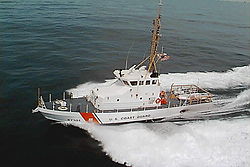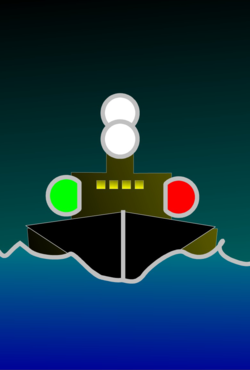Boat positions
The front of a boat is called the bow, while the rear of a boat is called the stern. When looking towards the bow (while on the boat), the left-hand side of the boat is the port side. Starboard is the corresponding word for the right side of a boat.
Parts of a Boat: Boating Terminology

Port and starboard are nautical terms for left and right, respectively. Port is the left-hand side of or direction from a vessel, facing forward. Starboard is the right-hand side, facing forward. Since port and starboard never change, they are clear references that do not depend on which way the observer is facing.[1]
History
The term starboard comes from the Old English steorbord, meaning the side on which the ship is steered. Before ships had rudders on their center-lines, they were steered with a steering oar at the stern of the ship. Because more people are right-handed it was placed on the right-hand side. The term is similar to the Old Norse stýri (rudder) and borð (side of a ship). Since the steering oar was on the right side of the boat, it would tie up at wharf on the other side. For this reason the left side was called port.
Formerly larboard was used instead of port. This is from Middle English ladebord and the term lade is related to the modern load.[2] Larboard sounded very similar to starboard and in 1844 the Royal Navy ordered that port be used instead.[3] Larboard continued to be used well into the 1850s by whalers. In Old English the word was bæcbord, which is used in other European languages, for example as the German backbord and the French term bâbord (derived in turn from Middle Dutch).
At night, the port side of a boat or aircraft is indicated by a red navigation light at the bow. The opposite side of the bow has a green one to help avoid collisions. The International Regulations for Preventing Collisions at Sea state that a ship on the left must give way to a ship on its right. If the courses of two boats are intersecting, the helmsman usually gives way to a red light by going around the stern of the stand-on vessel (the vessel that does not need to change course). A saying for this is:
"If to starboard red appear,
'tis your duty to keep clear...
Green to green, red to red
perfect safety, go ahead."[4]
Boat Positions Media
References
- ↑ "Why do ships use "port" and "starboard" instead of "left" and "right?"". NOAA. Retrieved May 18, 2015.
- ↑ "Why do sailors say 'port' and 'starboard', for 'left' and 'right'?". Royal Museums Greenwich. Retrieved 9 July 2015.[dead link]
- ↑ John William Norie; J. S. Hobbs, Sailing directions for the Bay of Biscay, including the coasts of France and Spain, from Ushant to Cape Finisterre (London: C. Wilson, 1847), p. 1: "An order, recently issued by the Lords Commissioners of the Admiralty, states, that in order to prevent mistakes, which frequently occur from the similarity of the words starboard and larboard, in future, the word port is to be substituted for larboard, in all Her Majesty’s ships or vessels."
- ↑ Eugene Edward O'Donnell, The Merchant Marine Manual (Boston, MA: The Yachtsman's guide, 1918), p. 21
Other websites
| Wikimedia Commons has media related to Lua error in Module:Commons_link at line 62: attempt to index field 'wikibase' (a nil value).. |

